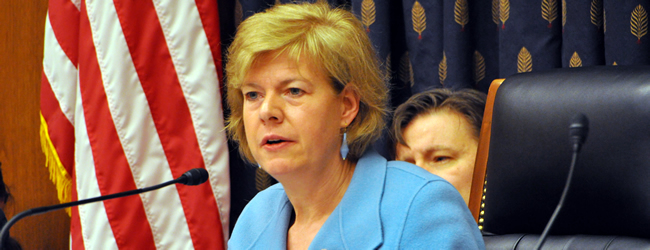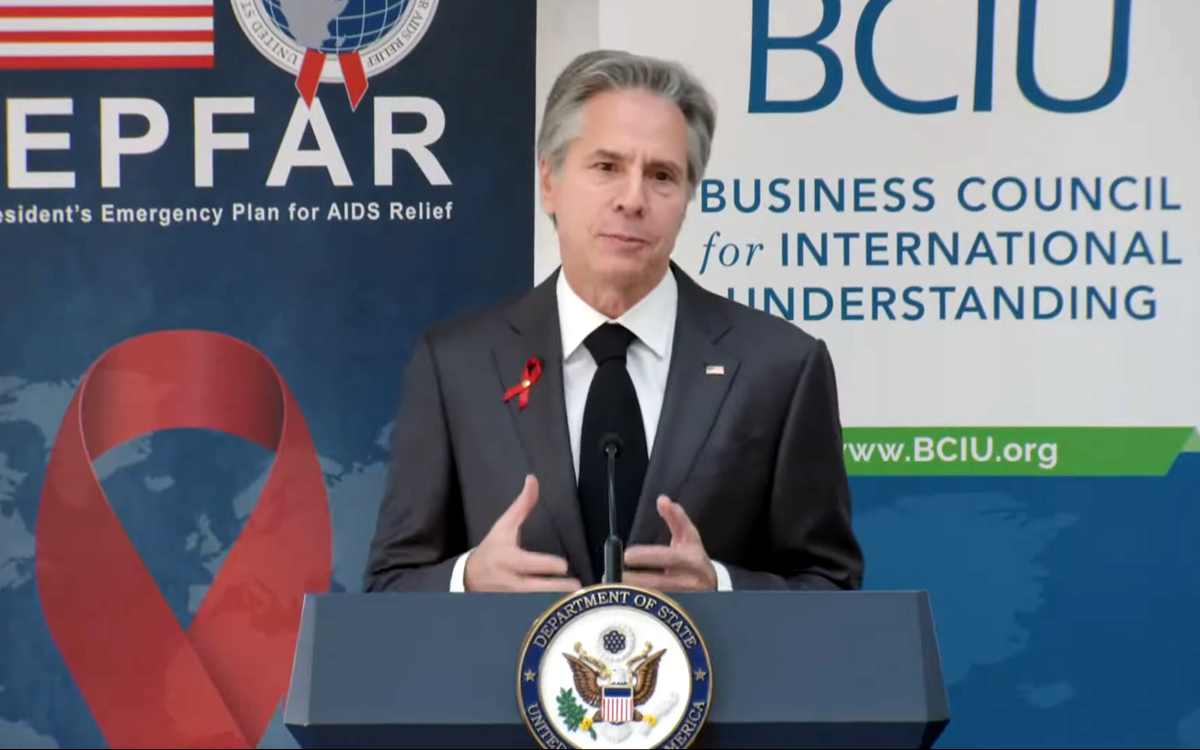National
Election results put LGBT advocates back on defense
Baldwin says chances ‘slim’ for ENDA in new Congress

In the wake of the seismic change brought about by Election Day results on Tuesday, supporters of LGBT rights are making new plans to advance their agenda in Congress as many signature bills now seem out of reach.
On Tuesday, the Republicans swept back into power by winning a majority of seats in the U.S. House and by shrinking the Democratic majority in the Senate.
CNN on Wednesday projected the GOP will take control of the U.S. House in the 112th Congress by winning at least 60 seats in the election — far more than the 39 seats the party needed to take control of the chamber.
House Minority Leader John Boehner (R-Ohio), who was given a score of “0” on the Human Rights Campaign’s most recent congressional scorecard, will likely replace House Speaker Nancy Pelosi (D-Calif.) in that role when Republicans come into power in the next Congress.
Democrats fared better in the Senate and retained control of the chamber. Many U.S. senators credited with being allies of the LGBT community, such as Majority Leader Harry Reid (D-Nev.) and Sen. Michael Bennet (D-Colo.), won re-election in tight races.
Still, Democrats in the Senate are left with a reduced majority and some LGBT allies, such as Sen. Russ Feingold (D-Wis.), were ousted by voters.
The major wins by the GOP raises serious doubts about moving big ticket pro-LGBT legislation — such as the Employment Non-Discrimination Act — in the next Congress.
Tammy Baldwin (D-Wis.), the only out lesbian in Congress, predicted the shift in control of the House will have a “very significant impact” on advancing pro-LGBT legislation.
“What I hope is that the Republican majority that takes over will not revert to its agenda of the last time they were in the majority, which put us frequently on the defense fighting back anti-gay measures,” she said.
Baldwin said the “chances are very slim” that ENDA or legislation providing partner benefits to federal workers would pass.
“I have seen no great signs that the Republicans who have been re-elected have changed their previous stances, and I certainly don’t feel like the new crop of candidates coming in are champions of gay rights,” she said.
Still, LGBT advocates say they see a path forward for advancing certain rights even with the challenge of Republican control of the House and reduced Democratic majorities in the Senate.
Fred Sainz, HRC’s vice president of communications, said the loss of the House will “certainly impede, but not entirely stop” his organization’s pursuit of LGBT rights through legislation.
Among the items that Sainz identified as having a chance for passing are legislation eliminating the tax penalty on employer-provided health benefits to same-sex partners. Sainz also said he sees a way forward for the Domestic Partner Benefits & Obligations Act.
“There could be space to pass something like a domestic partnership taxation bill, or even a [Domestic Partner Benefits & Obligations Act] bill,” Sainz said. “So, in terms of the federal legislative front, I think that that’s probably the best assessment at this point.”
Winnie Stachelberg, senior vice president for external affairs at the Center for American Progress, also said she sees room for the passage of tax equality legislation or a bill to extend partner benefits to federal workers.
“I think if you take a look at some of the issues around equality in benefits, equality in tax treatment — those are issues that I would make investments in and talk about when it comes to Congress,” she said.
Even though Democrats will be in the minority in the House, Sainz said HRC expects lawmakers to introduce major pro-LGBT legislation, such as ENDA and a bill that would repeal the Defense of Marriage Act.
Supporters of LGBT rights are also preparing for the possibility of anti-gay measures. Sainz said he expected “targeted attacks” with anti-LGBT bills and amendments in the Republican-controlled House.
“We will work to stop the legislative rollback at every turn,” Sainz said.
Which anti-gay measures might the House pursue? Sainz said he wouldn’t rule out the possibility of a federal constitutional amendment banning same-sex marriage.
“At the highest of levels, we may very well see another Federal Marriage Amendment,” Sainz said. “At probably the more opportunistic level, we may see things inserted into bills as amendments that may be harder to spot.”
Baldwin said LGBT advocates “need to be vigilant” and prepare for any number of anti-gay initiatives that might emerge from the House. Still, Baldwin said she thinks the passage of a Federal Marriage Amendment in the 112th Congress would be “unlikely.”
“I think that is unlikely simply because we still have the super majority requirements in the U.S. Senate, but it may come up, we will have to see,” she said.
Stachelberg said the Republican pledge to repeal the health care reform law should also be seen as an anti-gay initiative. Among other things, the law prohibits insurance companies from discriminating based on HIV status.
“Our community needs to be as vocal as any in beating back those efforts to repeal the health care bill,” Stachelberg said. “It would be devastating to our community.”
The Republican takeover of Congress has also augmented the sense of urgency around finishing legislative work on repealing “Don’t Ask, Don’t Tell” this year while Democrats control Congress.
Alex Nicholson, executive director of Servicemembers United, said the results on Election Day “underscore the urgent need” to wrap up efforts on repealing the military’s gay ban. A repeal measure is included as part of major defense budget legislation currently pending before the Senate.
“It would be a huge blow, not only to ‘Don’t Ask, Don’t Tell’ repeal advocates but also to defense contractors and military families, if we don’t get an authorization bill by the end of the year,” Nicholson said.
Nicholson said an “abdication” of the authorization of funds for new defense expenditures and personnel measures would be “unthinkable.”
“This Congress should not want to end its term with that enormous failure on its shoulders,” Nicholson said.
Baldwin also emphasized the importance of the lame duck session in moving forward with “Don’t Ask, Don’t Tell” repeal — although she characterized the Senate’s chances of passing repeal as only “possible.”
“My hope is that since the lame duck will occur with the hold over incumbents, that they can work their way through a filibuster or avoid a filibuster and resolve to pass legislation that would repeal ‘Don’t Ask, Don’t Tell,’” she said.
Many see passage of “Don’t Ask, Don’t Tell” in the lame duck session of Congress before Republicans take control as a challenge. One Democratic aide, who spoke on the condition of anonymity, said a lot has to come into alignment for the Senate to pass such legislation.
“The political climate during the lame duck session will be toxic,” the aide said. “Passage of the defense bill will require all the stars aligning. And it will be impossible to pass this bill without the active support and pressure from President Obama and Defense Secretary Robert Gates.”
With pro-LGBT initiatives possibly tied up for at least the next two years, many advocates are looking more closely at the Obama administration to make changes.
Stachelberg said the LGBT community needs to consider “a range” of ways to address inequality, including non-congressional action.
“Congress is part of that, for sure, but it would be terribly short-sighted if we didn’t invest in efforts to … build on the success that this administration has begun to develop with respect to the executive branch,” she said.
Among the administrative changes that Stachelberg said could be explored are regulatory changes, data collection, non-discrimination policies and funding streams.
Sainz said HRC would continue to push for non-legislative changes from the Obama administration.
“Where federal policy changes are concerned, we believe that non-legislative policy changes will become our continued avenue for progress at the federal level,” Sainz said. “That’s where we’re going to put an awful lot of resources over the next few years.”
According to an HRC document provided by Sainz, among the policy changes the organization is seeking from the administration is LGBT inclusion in health care reform implementation.
Specifically, HRC wants the Department of Health & Human Services to ensure that:
• health disparity and data collection efforts include sexual orientation and gender identity;
• state health insurance exchanges provide coverage available to same-sex partners and their children;
• and benefits packages that insurance plans offer don’t exclude treatments for gender transition.
Another policy change that HRC is seeking is ensuring that LGBT families are included in federal disaster relief.
According to HRC, LGBT families affected by Hurricane Katrina in 2005 were excluded from government services and subjected to anti-gay harassment in shelter facilities. HRC also asserts same-sex couples had difficulty obtaining housing or relief payments.
Consequently, HRC is urging urged the Department of Homeland Security and the Federal Emergency Management Agency to adopt policies barring discrimination against LGBT people and to ensure that their families can receive household aid.
Editor’s note: Tammy Baldwin photo is a Blade file photo by Michael Key
The White House
USCIS announces it now only recognizes ‘two biological sexes’
Immigration agency announced it has implemented Trump executive order

U.S. Citizenship and Immigration Services on Wednesday announced it now only “recognizes two biological sexes, male and female.”
A press release notes this change to its policies is “consistent with” the “Defending Women from Gender Ideology Extremism and Restoring Biological Truth to the Federal Government” executive order that President Donald Trump signed shortly after he took office for the second time on Jan. 20.
“There are only two sexes — male and female,” said DHS spokesperson Tricia McLaughlin in a statement. “President Trump promised the American people a revolution of common sense, and that includes making sure that the policy of the U.S. government agrees with simple biological reality.”
“Proper management of our immigration system is a matter of national security, not a place to promote and coddle an ideology that permanently harms children and robs real women of their dignity, safety, and well-being,” she added.
The press release notes USCIS “considers a person’s sex as that which is generally evidenced on the birth certificate issued at or nearest to the time of birth.”
“If the birth certificate issued at or nearest to the time of birth indicates a sex other than male or female, USCIS will base the determination of sex on secondary evidence,” it reads.
The USCIS Policy Manuel defines “secondary evidence” as “evidence that may demonstrate a fact is more likely than not true, but the evidence does not derive from a primary, authoritative source.”
“Records maintained by religious or faith-based organizations showing that a person was divorced at a certain time are an example of secondary evidence of the divorce,” it says.
USCIS in its press release notes it “will not deny benefits solely because the benefit requestor did not properly indicate his or her sex.”
“This is a cruel and unnecessary policy that puts transgender, nonbinary, and intersex immigrants in danger,” said Immigration Equality Law and Policy Director Bridget Crawford on Wednesday. “The U.S. government is now forcing people to carry identity documents that do not reflect who they are, opening them up to increased discrimination, harassment, and violence. This policy does not just impact individuals — it affects their ability to travel, work, access healthcare, and live their lives authentically.”
“By denying trans people the right to self-select their gender, the government is making it harder for them to exist safely and with dignity,” added Crawford. “This is not about ‘common sense’—it is about erasing an entire community from the legal landscape. Transgender, nonbinary, and intersex people have always existed, and they deserve to have their identities fully recognized and respected. We will continue to fight for the rights of our clients and for the reversal of this discriminatory policy.”
Federal Government
Mass HHS layoffs include HIV/AIDS prevention, policy teams
Democratic states sue over cuts

Tuesday began a series of mass layoffs targeting staff, departments, and whole agencies within the U.S. Department of Health and Human Services under Secretary Robert F. Kennedy Jr., who reportedly plans to cut a total of 10,000 jobs.
On the chopping block, according to reports this week, is the Office of Infectious Disease and HIV/AIDS Policy. A fact sheet explaining on the restructuring says “a new Administration for a Healthy America (AHA) will consolidate the OASH, HRSA, SAMHSA, ATSDR, and NIOSH, so as to more efficiently coordinate chronic care and disease prevention programs and harmonize health resources to low-income Americans.”
The document indicates that “Divisions of AHA include Primary Care, Maternal and Child Health, Mental Health, Environmental Health, HIV/AIDS, and Workforce, with support of the U.S. Surgeon General and Policy team.”
“Today, the Trump administration eliminated the staff of several CDC HIV prevention offices, including entire offices conducting public health communication campaigns, modeling and behavioral surveillance, capacity building, and non-lab research,” said a press release Tuesday by the HIV + Hepatitis Policy Institute.
The organization also noted the “reassignments” of Jonathan Mermin, director of the National Center for HIV, Viral Hepatitis, STD, and TB Prevention, and Jeanne Marrazzo, director of the National Institutes of Health’s National Institute of Allergy and Infectious Diseases. Both were moved to the Indian Health Service.
“In a matter of just a couple days, we are losing our nation’s ability to prevent HIV,” said HIV + Hepatitis Policy Institute Executive Director Carl Schmid. “The expertise of the staff, along with their decades of leadership, has now been destroyed and cannot be replaced. We will feel the impacts of these decisions for years to come and it will certainly, sadly, translate into an increase in new HIV infections and higher medical costs.”
The group added, “We are still learning the full extent of the staff cuts and do not know how the administration’s announced reorganization of HHS will impact all HIV treatment, prevention, and research programs, including President Trump’s Ending the HIV Epidemic initiative,” but “At the moment, it seems that we are in the middle of a hurricane and just waiting for the next shoe to drop.”
A group of 500 HIV advocates announced a rally planned for Wednesday morning at 8 a.m., at the U.S. Capitol lawn across from the Cannon House Office Building, which aims to urge Congress to help stop the cuts at HHS.
“Over 500 advocates will rally on Capitol Hill and meet with members of Congress and Hill staff to advocate for maintaining a strong HIV response and detail the potential impact of cuts to and reorganization of HIV prevention and treatment programs,” the groups wrote.
The press release continued, “HHS has stated that it is seeking to cut 10,000 employees, among them 2,400 CDC employees, many doing critical HIV work. It also seeks to merge HIV treatment programming into a new agency raising concerns about maintaining resources for and achieving the outstanding outcomes of the Ryan White HIV/AIDS Program.”
On Tuesday a group of Democratic governors and attorneys general from 23 states and D.C. filed a lawsuit against HHS and Kennedy seeking a temporary restraining order and injunctive relief to halt the funding cuts.
U.S. Centers for Disease Control and Prevention withdrew approximately $11.4 billion in funding for state and community health departments during the COVID-19 pandemic response, along with $1 billion to the Substance Abuse and Mental Health Services Administration.
“Slashing this funding now will reverse our progress on the opioid crisis, throw our mental health systems into chaos, and leave hospitals struggling to care for patients,” New York Attorney General Letitia James said.
State Department
Former US envoy for global LGBTQ, intersex rights slams Trump
Former President Joe Biden appointed Jessica Stern in 2021

Jessica Stern, the former special U.S. envoy for the promotion of LGBTQ and intersex rights, says the work that she and her colleagues did under the Biden-Harris administration is “being systematically dismantled.”
“As the person who was responsible for leading U.S. foreign policy on LGBTQI+ issues, it’s been very difficult for the past two months to see that work being systematically dismantled,” she told the Washington Blade on March 19 during a telephone interview.
Stern was the executive director of Outright International, a global LGBTQ and intersex advocacy group, when then-President Joe Biden appointed her in June 2021.
The promotion of LGBTQ and intersex rights was a cornerstone of the Biden-Harris administration’s overall foreign policy. These efforts specifically included the decriminalization of consensual same-sex sexual relations and marriage equality efforts in countries where activists said they were possible through the legislative or judicial processes.
The Trump-Vance administration’s decision to freeze most U.S. foreign aid spending for at least 90 days has had a devastating impact on the global LGBTQ and intersex rights movement. President Donald Trump’s executive order that bans the State Department from issuing passports with “X” gender markers has prompted Germany and several other European countries to issue travel advisories for transgender and nonbinary people who are planning to visit the U.S.
Stern said the Trump-Vance administration “has studied the anti-LGBTQI strategies of other countries and basically imported the worst ideas from around the world: The most violent, the most dehumanizing, the most targeting strategies.” Stern added these policies have emboldened Hungarian Prime Minister Viktor Orbán, Russian President Vladimir Putin, Argentine President Javier Milei and other anti-LGBTQ heads of state.
“It’s one thing when a small country that has limited global reach implements anti-LGBTQI laws and policies. It’s another thing when one of the world’s superpowers does so,” Stern told the Blade. “There’s no question that the U.S.’s regression on LGBTQI rights is actually going to accelerate backlash against LGBTQI people around the world.”
“We provide political legitimacy to those ideas, but also we’re forging new alliances and coalitions, and we’re pushing these ideas on other countries,” she added. “So, it’s not a passive action. The U.S. government currently is actively funding and disseminating anti-LGBTQI hatred around the world.”
Former State Department colleagues ‘afraid every day’
The Trump-Vance administration in a Feb. 3 statement that defended its efforts to dismantle the U.S. Agency for International Development noted examples of the organization’s “waste and abuse” included $2 million for “sex changes and ‘LGBT activism'” in Guatemala and $1.5 million to “advance diversity, equity and inclusion in Serbia’s workplaces and business communities.” Secretary of State Marco Rubio last month said 83 percent of USAID contracts have been cancelled, and the remaining will “now be administered more effectively under the State Department.”
Rubio after the Trump-Vance administration froze nearly all U.S. foreign aid spending issued a waiver that allowed the President’s Emergency Plan for AIDS Relief and other “life-saving humanitarian assistance” programs to continue to operate.
The Blade has previously reported PEPFAR-funded programs in Kenya, South Africa, and elsewhere have suspended services and even shut down because of a lack of U.S. funding. UNAIDS Executive Director Winnie Byanyima on March 24 said 6.3 million more people around the world will die of AIDS-related complications over the next four years if the U.S. does not fully restore its foreign assistance.
Stern said her former State Department colleagues are “afraid every day.”
“They never know, ‘Am I going to be fired today?’ “Am I going to be put on administrative leave?’,” she said. “I cannot even imagine what it’s like to go to work every day.”
Stern told the Blade her former colleagues tell her that “there’s not a lot of foreign policy work happening because there’s so much disruption being caused by DOGE (the Department of Government Efficiency).”
“Entire departments have been decimated,” she said, noting one of them has lost 60 people. “It’s almost inconceivable to figure out how to restructure your work when your resources have been decimated.”

Stern described herself as “an eternal optimist” when the Blade asked whether she thinks the U.S. can ever stand for LGBTQ and intersex rights abroad.
“You have to believe in human rights,” she said.
Stern said former Secretary of State Antony Blinken as “an ally on LGBTQI issues.” Stern also said many of her now former State Department colleagues thanked her and her team for their work before they left government.
“There’s so much compassion from straight and cisgendered allies, from career officials, people that are not human rights experts or specialists, people that don’t focus on the well-being of LGBTQI people, but people that care very much about the United States standing for its values, the rule of law, equality for all, and this notion that it is in our national interest to ensure that there is safety, prosperity, and well-being for people around the world,” she said.
“The situation we find ourselves in will not last forever,” added Stern. “What we have to do is figure out how to hold the line right now, and how to organize for the future.”
She stressed ways to “hold the line” include litigation, protests, letters-to-the-editor, demanding accountability from lawmakers.
“There’s so much to do,” said Stern.

Stern is currently teaching at Columbia University’s School of International and Public Affairs, and is writing about her experience as the “first-ever human rights expert to be the special U.S. envoy for LGBTQI rights.” Stern also told the Blade that she is working to launch a new organization.
“I love being an activist again,” she said. “If there was ever a time when activists are needed, it’s now.”
“I am really proud to have rejoined the resistance,” added Stern.
-

 Movies2 days ago
Movies2 days agoSexy small town secrets surface in twisty French ‘Misericordia’
-

 Federal Government3 days ago
Federal Government3 days agoMass HHS layoffs include HIV/AIDS prevention, policy teams
-

 Maryland4 days ago
Maryland4 days agoAt transgender visibility celebration, Moore called out for lack of action
-

 Arts & Entertainment4 days ago
Arts & Entertainment4 days ago‘Think of those who have not been seen,’ Cynthia Erivo’s powerful message at GLAAD Awards










